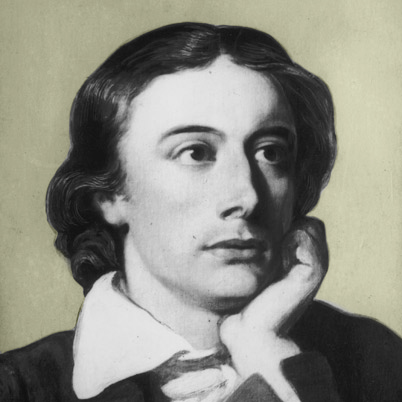
With no shortage of passion of any sort, John Keats writes to his fiancée Fanny Brawne to express frustration with his failing health and anxiety over the prospect of leaving her. Keats did leave that fall to go to Italy, where he died in February 1821. Though he resents his friend Charles Brown as a rival below, one of his last letters requests that Brown “be a friend to Miss Brawne when I am dead…If there is anything you can do for her by word or deed I know you will do it.”
[Kentish Town
August 1820?]
I do not write this till the last
that no eye may catch it.
My dearest Girl,
I wish you could invent some means to make me at all happy without you. Every hour I am more and more concentrated in you; every thing else tastes like chaff in my Mouth. I feel it almost impossible to go to Italy—the fact is I cannot leave you, and shall never taste one minute’s content until it pleases chance to let me live with you for good. But I will not go on at this rate. A person in health as you are can have no conception of the horrors that nerves and a temper like mine go through. What Island do your friends propose retiring to? I should be happy to go with you there alone, but in company I should object to it; the back-bitings and jealousies of new colonists who have nothing else to amuse themselves, is unbearable…If I cannot live with you I will live alone. I do not think my health will improve much while I am separated from you. For all this I am averse to seeing you—I cannot bear flashes of light and return into my glooms again…To be happy with you seems such an impossibility! it requires a luckier star than mine! it will never be. I enclose a passage from one of your letters which I want you to alter a little—I want (if you will have it so) the matter express’d less coldly to me. If my health would bear it, I could write a Poem which I have in my head, which would be a consolation for some people in such a situation as mine. I would show someone in Love as I am, with a person living in such Liberty as you do. Shakespeare always sums up matters in the most sovereign manner. Hamlet’s heart was full of such Misery as mine is when he said to Ophelia “Go to a Nunnery, go, go!” Indeed I should like to give up the matter at once—I should like to die. I am sickened at the brute world which you are smiling with. I hate men, and women more. I see nothing but thorns for the future—wherever I may be next winter, in Italy or nowhere, Brown will be living near you with his indecencies. I see no prospect of any rest…I wish you could infuse a little confidence of human nature into my heart. I cannot muster any—the world is too brutal for me—I am glad there is such a thing as the grave—I am sure I shall never have any rest till I get there. At any rate I will indulge myself by never seeing any more Dilke or Brown or any of their Friends. I wish I was either in your arms full of faith or that a Thunder bolt would strike me.
God bless you,
J.K.
From The Letters of John Keats. Edited by H. Buxton Forman. London: Reeves & Turner, 1895.
FURTHER READING
To learn more about John Keats and Fanny Brawne’s relationship, click here.
Read a review of Nicholas Roe’s new biography of Keats here.


